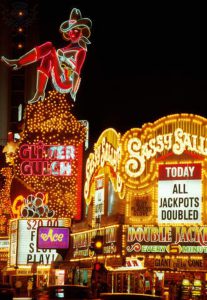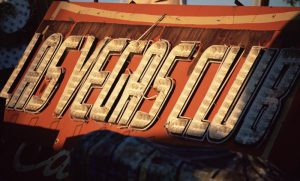
“Las Vegas At Night”/ Credit: Bill Aron / Photo Researchers / Universal Images Group
In his introduction to Nevada Yesterdays: Short Looks at Las Vegas History, Las Vegas journalist John L. Smith says: “Las Vegas history, the real Las Vegas history, makes fops and fools of even the most sincere explorers. The City’s story is riddled with blind alleys, dead ends, crazy twists, and outright fabrication.” Fortunately, dedicated local Nevada historians and archivists have continued to re-examine and sustain the fascinating record of our desert hometown. They knew how important it would be to future generations to understand and capture the fast-moving history of Las Vegas as it happened.
Choosing a local history topic can be research in itself. Ask yourself, why is it important that readers know this fact or that story about Las Vegas? Some people will tell you that living in Las Vegas is like living in the future. Opinion polls appreciate the fact that our population is already a slice of the national whole. Many features of living here, such as our 24-hour lifestyle, are unique to Las Vegas. So your research may lead you to discover something just trending across the country, but already happening in Las Vegas, or it might lead you to explore something unique to our city. It’s especially important to ask why and how our history has taken such a hold on the American imagination, and where it fits into the larger context of American aspirations or the overall national historical picture.
When it comes to writing your papers or speeches about Las Vegas, it may all come down to knowing where to locate the key primary and secondary resources. These can include both quantitative and qualitative information — census data as well as oral history, for example.
Primary Sources – In general, these include the immediate, first-hand documents recorded at the time of an event or first-hand accounts of events like oral histories as well as original creative works. Primary sources can include the texts of laws, court cases and decisions. Other original government documents, newspaper reports by eyewitness reporters, speeches, diaries, letters, interviews and original scientific research are included. Photographs, video, audio, census data, economic statistics, original artwork, literature, maps, blogs, twitter feeds, and e-mails are also primary sources. Your best bets for primary resources include:
- UNLV Special Collections
- Nevada State Library Archives and Public Records
- Las Vegas Clark County Library District/Las Vegas History
- Henderson Public Library/ Henderson History in Scrapbooks
- Nevada Law Library and Clark Co. Law Library
- Las Vegas/NV News
- United States Census Bureau/Las Vegas
- Las Vegas Open Data Portal and Clark County School District Open Book
- Las Vegas Metro Chamber of Commerce
- City of Las Vegas and State of Nevada
Secondary Sources – In general, these are interpretations and analysis of the issues or topics based on a review of primary sources. Secondary sources typically include encyclopedias, handbooks, textbooks, and books and articles that interpret, analyze, or review original research and primary source material. It’s easier to keep things straight if you think that an autobiography is a primary source while a biography is a secondary source. Secondary sources are a great way to get background information on a topic – and can serve to fill-in the knowledge gaps about a certain issue, event, place, or chronology. Your best bets for secondary resources include:
- Online Nevada Encyclopedia
- Political History of Nevada
- U.S. History in Context
- Encyclopedia of Immigration and Migration
- Credo Reference
- Nevada Historical Society Quarterly/1957-2009
- Nevada: A History of the Silver State
- Neon Metropolis
- Strip Cultures
– Another way to gather information is to view one of the many great films on Las Vegas history available to you by simply clicking on the purple Find Films button on the Library’s webpage and entering the search term Las Vegas.
– Consider creating your own first-hand report by taking a walking tour of our local recreational areas, the Hoover Dam, Fremont Street, a museum, or the Strip – the possibilities are endless and original!
– Consider interviewing CSN faculty who work in the real Las Vegas including those from Culinary, Hospitality, Criminal Justice, Health Sciences, Aviation, or Business Departments.
As always, be sure to Ask a Librarian for assistance with finding and citing resources.
Viva Las Vegas!

Las Vegas Club sign/ Credit: Neil Emmerson / Robert Harding World Imagery / Universal Images Group


